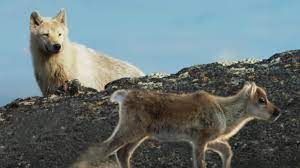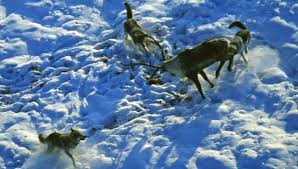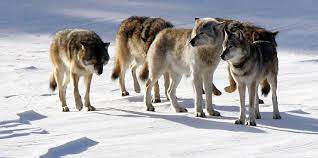THE WOLF-DEER CONTROVERSY by Ralph Bice
From April 20, 1977
Short while back I had a phone call from a reader who asked my opinion about the seemingly endless controversy about the wolf-deer question. He was not taking sides, but asked my opinion about the question whether wolves kill for lust, or just for food.
I have seen many wolf kills. I have seen where a deer was killed, and not enough evidence to tell the age of sex of the animal left. I have seen kills where only a small meal was taken. So one would think that it depends on the number of wolves in on the kill, how hungry they were, and also on the supply of food, meaning deer in that particular area.
This happened while I was away but the report came that wolves had killed a number of deer in the Spence area. An investigation was made, and I was told that the report was that these deer died of starvation. A further investigation by an independent biologist showed that they were all killed by wolves. A picture in a local paper showed partly eaten deer.
Near Willow Lake the wolves found a small yard and when a deer was killed only a small part was eaten. By the way, the deer at Willow Lake as well as the deer kills at Spence showed that in spite of the heavy snow the deer had wintered well as there still was a lot of fat inside the skin. So any deer that escaped the wolves are in good shape to start the summer.
Most of us are ready to believe any evidence that leans the way we are thinking. Too, far too many reasons and excuses for the scarcity of deer are based on theory, and if facts were studied would be proven wrong.
There was a study made by two biologists in the Northwest Territories a few years back. Their report was printed in some papers. It sort of shows that wolves do kill just for fun. But I doubt if it will settle any arguments.

Conducting an intensive study on the caribou range near the shore of Hudson’s Bay in the Northwest Territories during the calving period, two experts from the Wildlife Service of Environment Canada shed new light on the relationship between wolves and their prey. Their report is bound to add fuel to the controversy that currently rages around the wolf.
Based on their observations, they calculated that 25 wolves killed 2,240 caribou calves over a two-month period. Most disturbing is the evidence they offer which proves conclusively that the wolf does not simply kill for food but indulges in indiscriminate killing from sheer lust.
Both Dr. Frank L. Miller, wildlife biologist and Dr. Eric Broughton, veterinary pathologist, have been with the wildlife service for ten years and have been involved in caribou studies since 1966. Their assignment was to assess and establish the mortality factors which had a direct bearing on the viability of the caribou herds.
They found predation by wolves to be the largest single factor inhibiting the increase of caribou. Their findings show that 33% were utilized minimally while the remaining 30% were utilized 50% of the time or half eaten.
In those cases that were utilized minimally, only the tongues and a part of the cheek or the heart or liver was eaten.

The report would seem to favour a reduction in the wolf numbers as it states in part: “We suggest that as the high loss of newborn calves to wolves could be a major factor limiting the population’s growth, the desirability of reducing predation on calves by wolves should be considered by management agencies.”
